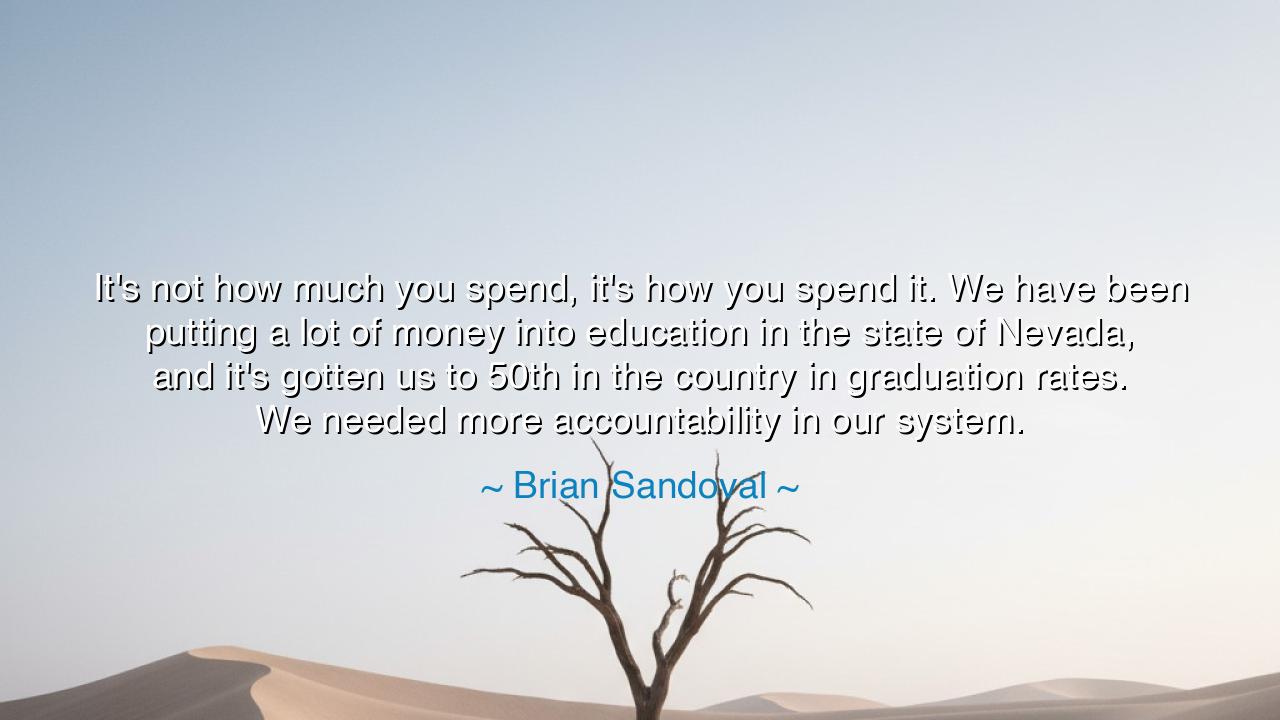
It's not how much you spend, it's how you spend it. We have been
It's not how much you spend, it's how you spend it. We have been putting a lot of money into education in the state of Nevada, and it's gotten us to 50th in the country in graduation rates. We needed more accountability in our system.






In the firm and measured words, “It’s not how much you spend, it’s how you spend it. We have been putting a lot of money into education in the state of Nevada, and it’s gotten us to 50th in the country in graduation rates. We needed more accountability in our system,” Brian Sandoval speaks as one who understands that wisdom lies not in excess, but in purpose. His words echo an ancient principle known to every great civilization — that abundance without direction leads not to prosperity, but to decay. Wealth, when unguided by discipline, becomes waste; effort, when unmeasured, breeds illusion. Sandoval’s insight is a call to awaken from the slumber of complacency, to remember that true progress is born not from the volume of resources, but from the virtue of their use.
The origin of this quote lies in Sandoval’s years as Governor of Nevada, a state long challenged by educational struggles. Though funding for schools had increased, the results — low graduation rates and uneven achievement — revealed a deeper ailment. The problem was not scarcity, but structure, not poverty of money, but poverty of accountability. Sandoval, trained as both a lawyer and a leader, saw the truth that many fear to speak: systems fail not because they lack gold, but because they lack vision. In this, he stands among the ancient reformers — men who dared to remind their people that wealth and wisdom are not the same.
The ancients would have recognized the truth in Sandoval’s words. When the great Roman Republic began to decline, its senators sought to solve every crisis by pouring more coin into the problem — more armies, more feasts, more spectacle. Yet the moral core of Rome was crumbling, not for want of funds, but for want of virtue and vigilance. The philosopher Cicero warned, “The budget should be balanced, the treasury replenished, and public debt reduced.” His words, like Sandoval’s, carried the timeless message that resources are sacred only when used with integrity. The greatness of a nation, or of any person, is not measured by what it possesses, but by how wisely it stewards what it holds.
Sandoval’s quote, though spoken of education, applies to every realm of human endeavor. Whether in governments, households, or hearts, the same law reigns: abundance without purpose corrodes, but purpose sanctifies even the smallest resource. To pour money into schools without demanding excellence is like watering barren soil without sowing seed — effort without fruit. Likewise, to chase success without accountability is to drift without anchor. Sandoval’s call for accountability is thus not a political plea, but a moral one — to restore the link between responsibility and result, between labor and legacy.
There is a deep emotional undercurrent in his words as well — a leader’s disappointment that good intentions alone are not enough. For it is easy to believe that generosity solves all things, that spending signals care. But wisdom teaches otherwise: true compassion requires discipline. A parent who spoils a child may mean well, but in shielding them from consequence, denies them growth. So too with societies that invest without scrutiny — they nurture dependency instead of strength. Sandoval’s insight is an act of tough love, the kind that seeks not applause, but transformation.
History offers us another mirror in the story of King Solomon, famed for both wealth and wisdom. When two women came before him, each claiming to be the mother of a child, Solomon’s judgment was not lavish, but discerning. He saw that justice and wisdom are not products of wealth, but of clarity. In the same way, Sandoval’s teaching reminds us that governance and reform are not about how much we give, but about how deeply we understand what we give for. Gold can build schools, but only wisdom builds minds.
The lesson in Sandoval’s reflection is clear and universal: measure not your success by the scale of your spending, but by the strength of your results. Intent without accountability is a hollow virtue. Whether one leads a family, a company, or a nation, the same law holds — what matters most is not what you have, but what you make of it. Purpose refines power; discipline multiplies value. Without these, abundance becomes burden.
And the practical action is this: whatever resources are entrusted to you — your time, your money, your influence — use them as if they were sacred flame. Direct them toward meaning, not vanity; toward growth, not show. Ask not, “How much do I give?” but rather, “What will this create?” For as Brian Sandoval reminds us, true greatness is not built by the size of our investment, but by the wisdom of our stewardship. In the end, the richest nations, the strongest families, and the most fulfilled souls are those who remember that prosperity is not a matter of possession — it is a matter of purpose.






AAdministratorAdministrator
Welcome, honored guests. Please leave a comment, we will respond soon